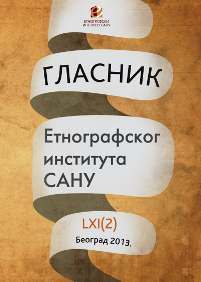Постмодернизам и хуманистичке науке. Пример историографије
Postmodernism and the Humanities. The Case of Historiography
Author(s): Kosta NikolićSubject(s): History
Published by: Етнографски институт САНУ
Keywords: postmodernism; humanities; intellectualism; historiography; the culture of memory.
Summary/Abstract: Postmodernism, as a specific ideal orientation, typical of the last three decades of 20th century, reached historiography with certain delay. Particularly with the thesis of impossibility to know the past, postmodernism strongly influenced historiography as a literar form. Cognitive skepticism and denial of the scientific nature of historiography were the direct consequence of the influence of Postmodernist thinking on historical science. In traditional societies like the Serbian one, historical consciousness had been built on myths for a long time, because of the nature of the society itself, and also because many historians followed irrational ideas from its nations past. What represents a spectrum of historical science (criticism and irrational overview of the past and adequate adoption of valuable judgements) confronts a mythical heritage which determined the historical consciousness. Postmodernism especially negated the neutral pretension of historiography and questioned its scientism. Elimination the need for knowledge was the key factor of the breakdown of the system of values in Serbian society in the last two decades and it was also a key factor for the advent of the phenomenon of culture and scientific regression. In a modern society, in the research of history from the earlier times, you can see an important possibility for building a general culture which would be used for a more complete overview and a more precise understanding of a world that’s become more and more complex. The modern humanist science fights emotions with common sense thus expanding a person’s freedom. Because of that, Serbian Science Community can’t accept the marketing principal in making knowledge. The scientists, especially historians, must use their acquired knowledge of the past to build an intellectual opinion that will establish a new identity for this science. The author underlines the view that the science dealing with the study of the past must never again be perceived as a motive of totalitarian propaganda in the service of a specific ideological pattern.
Journal: Гласник Етнографског института САНУ
- Issue Year: LXI/2013
- Issue No: 2
- Page Range: 53-66
- Page Count: 14
- Language: Serbian

